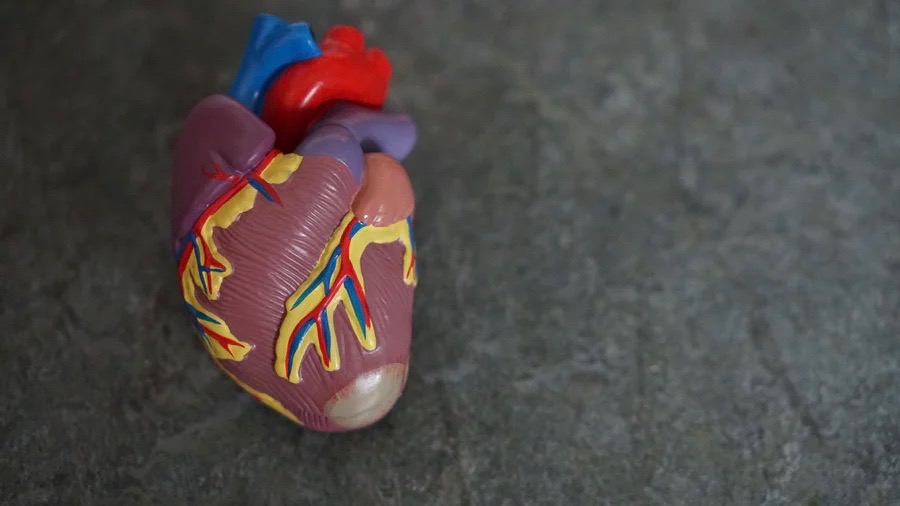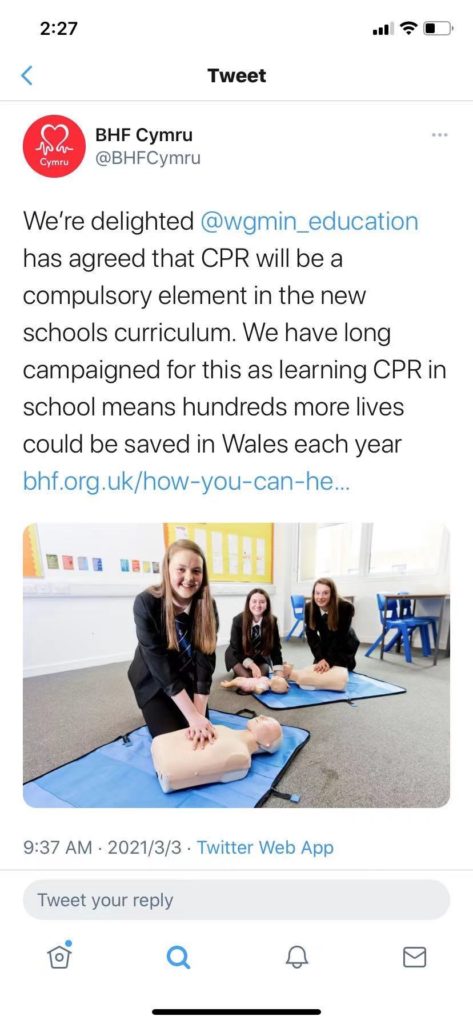Imagine 15 to 30 students practicing CPR on little dummies together. This spectacular picture from Emma’s memory will soon become a view in Welsh schools.

Emma Henwood, Policy and Public Affairs Manager at Sport Wales, worked for British Heart Foundation Cymru from 2018 to 2020 where she won BHF Cymru three awards at the PRCA awards in 2020 for the Campaign to include CPR on the new Welsh curriculum.
CPR (cardiopulmonary resuscitation) is an emergency medical technique aiming to restart a person’s heart or breath usually by chest compressions or mouth-to-mouth breathing. It was added to the English secondary school curriculum two years ago, and in Scotland this started in 2019.
In Wales, CPR was announced by Kirsty Williams, Minister for Education in the Welsh Government for a compulsory curriculum in Welsh secondary schools on 3 March.

As the principal who managed this national, multimedia and stakeholder campaign to secure CPR on the new Welsh curriculum, Emma Henwood talked about her indissoluble fate with CPR since she was 14, telling us how a primary school student was encouraged to learn this simple but extremely useful technique, with the noble pursuit of saving lives.

Q:How do you view the importance of the campaign’s success?
A : I am absolutely thrilled, to be honest. I did not think that it would ever happen. The Welsh government have been quite clear that the new curriculum was meant to be very holistic. It is just the most phenomenal and exciting success because it might take five or ten years. But in the long run, we are probably to see more people’s lives saved, I cannot tell you how exciting that is.
Q: Why CPR is so potentially useful to save lives?
A:It does take a little bit of pressure. One of the key things is when you are doing the compression on the heart, you are actually keeping oxygen going all the way around the body.
People often get afraid if it is a passer-by on the street and they need to give mouth to mouth resuscitation. But they don’t have to. They can still give the compression. I think a lot of people are scared of doing it, because they don’t know maybe if they will break bones or hurt someone.
Q: How can we overcome fear and learn this skill?
A: The key message is, if one don’t get that life-saving compression treatment, then he is going to die.
I witness a class of 15 people up to 30 people all doing it together, and it is so nice you feel like you are learning together. You don’t feel like you are putting yourself out in front of people. There are so many great things about the skill, it really empowers children.
At the moment, people who have a cardiac arrest, one in ten people survives. But evidence shows that if everybody learns CPR, that up to about five in ten people could potentially be saved. It is a massive increase.
Q: Can you tell me more specifically about the importance of the campaign in Wales?
A: For people in Wales, there was a bit of disparity. It is fine when policy is different from nation to nation. But when it comes to something as important as saving a life, there should not be discrepancies.
The new Welsh curriculum offers a really good home for this sort of skills, because we want all of our children to go out into the world and to be the best citizens that they can. If we can empower them to save people’s lives, all the better.’
“If everybody learns how to use their body to save another person, then I think we all become much better citizens. We all care a bit more about what might be happening to that person next door to me. I feel quite strongly about this skill.” Emma said.
